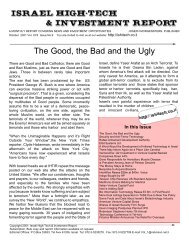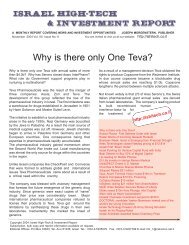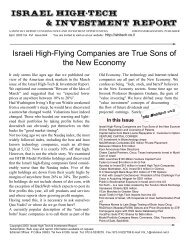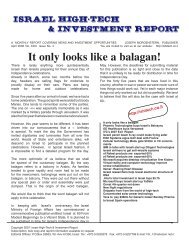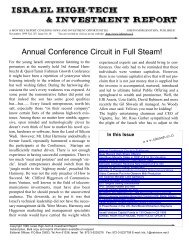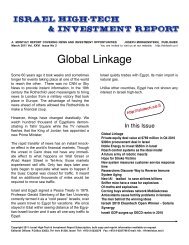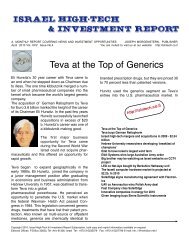Water, Water Everywhere... - The Israel High Tech & Investment Report
Water, Water Everywhere... - The Israel High Tech & Investment Report
Water, Water Everywhere... - The Israel High Tech & Investment Report
Create successful ePaper yourself
Turn your PDF publications into a flip-book with our unique Google optimized e-Paper software.
July-August<br />
ter in Herzliyah Pituach around it.<br />
<strong>The</strong> acquisition of Digital Fuel will add<br />
150 employees to VMware’s workforce,<br />
a third of them at Digital Fuel’s <strong>Israel</strong>i<br />
development center. <strong>The</strong> acquisition<br />
could therefore increase the workforce<br />
at VMware’s <strong>Israel</strong>i development center<br />
by over 50%.<br />
How adversity dulls our perceptions<br />
Adversity, we are told, heightens our<br />
senses, imprinting sights and sounds<br />
precisely in our memories. But new<br />
Weitzman Institute research, which<br />
appeared in Nature Neuroscience, suggests<br />
the exact opposite may be the<br />
case. Perceptions learned in an aversive<br />
context are not as sharp as those<br />
learned in other circumstances. <strong>The</strong><br />
findings, which hint that this tendency<br />
is rooted in our species’ evolution, may<br />
help to explain how post-traumatic stress<br />
syndrome and other anxiety disorders<br />
develop in some people.<br />
To investigate learning in unfavorable<br />
situations, Dr. Rony Paz of the Institute’s<br />
Neurobiology Department, together with<br />
his student Jennifer Resnik , had volunteers<br />
learn that some tones lead to<br />
an offensive outcome (e.g. a very bad<br />
odor), whereas other tones are followed<br />
by pleasant a outcome, or else by nothing.<br />
<strong>The</strong> volunteers were later tested for<br />
their perceptual thresholds – that is, how<br />
well they were able to distinguish either<br />
the “bad” or “good” tones from other<br />
similar tones.<br />
As expected from previous studies, in<br />
the neutral or positive conditions, the<br />
volunteers became better with practice<br />
at discriminating between tones.<br />
But surprisingly, when they found themselves<br />
exposed to a negative, possibly<br />
disturbing stimulus, their performance<br />
worsened.<br />
<strong>The</strong> differences in learning were really<br />
very basic differences in perception.<br />
After learning that a stimulus is associated<br />
with highly unpleasant experience,<br />
the subjects could not distinguish it from<br />
other similar stimuli, even though they<br />
could do so beforehand, or in normal<br />
conditions. In other words, no matter<br />
how well they normally learned new<br />
things, the subjects receiving the “aversive<br />
reinforcement” experienced the two<br />
tones as the same.<br />
Paz: “This likely made sense in our<br />
evolutionary past: If you’ve previously<br />
heard the sound of a lion attacking, your<br />
survival might depend on a similar noise<br />
sounding the same to you – and pushing<br />
the same emotional buttons. Your<br />
instincts, then, will tell you to run, rather<br />
than to consider whether that sound<br />
was indeed identical to the growl of the<br />
lion from the other day.”<br />
Paz believes that this tendency might<br />
be stronger in people suffering from<br />
post-traumatic stress syndrome. As an<br />
example, he points to the 9-11 terror<br />
attacks in New York. Many of those<br />
who witnessed the strikes on the towers<br />
developed post-traumatic stress syndrome,<br />
which, for many of them, can be<br />
triggered by tall buildings. Intellectually,<br />
they may know the building before them<br />
bears little similarity to the destroyed<br />
towers, but on a more fundamental,<br />
instinctive level, they might perceive all<br />
tall buildings to be the same and thus<br />
associate them with terrifying destruction.<br />
<strong>The</strong> scientific team is now investigating<br />
this idea in continuing research, in<br />
which they hope, among other things,<br />
to identify the<br />
14



